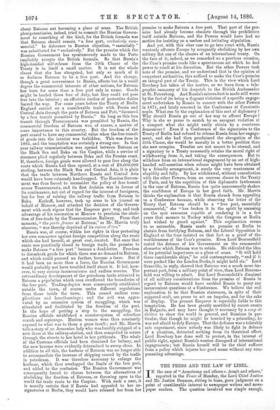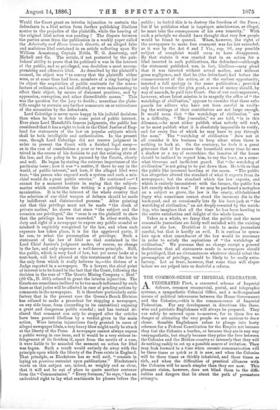THE PRESS AND THE LAW OF LIBEL.
IN the case of " Armstrong and others v. Armit and others," reported in the Times of Monday, the Lord Chief Justice and Mr. Justice Denman, sitting in bane, gave judgment on a point of considerable interest to newspaper writers and news- paper readers. The question involved was simple enough.
Would the Court grant an interim injunction to restrain the defendants in a libel action from further publishing libellous matter to the prejudice of the plaintiffs, while the hearing of
the original libel action was pending The dispute between the parties arose from the publication in a weekly paper called the Admiralty and Horse Guards Gazette, of an alleged false and malicious libel contained in an article reflecting upon Sir William Armstrong, Captain Noble, W. G. Amstrong, and Michell and Co. The article, if not protected by the pub- lishers' ability to prove that its publication was in the interest of the public, and so privileged, was doubtless a most uncom- promising and offensive libel. As described by the plaintiff's counsel, its object was " to convey that the plaintiffs either were, or at some time had been, members of a ring having for its object the acquisition of public contracts for the manu- facture of ordinance, and had effectedror were endeavouring to effect their object, by means of dishonest practices, and by oppression, corruption, and other discreditable means." This was the question for the jury to decide ; meantime the plain- tiffs sought to restrain any further comments on or reiterations of the accusation by the defendants.
Lord Coleridge is never more happy in his judicial decisions than when he has to decide some point of public interest. Ever since Lord Mansfield's famous judgments, the public has considered that it has a right to look to the Chief Justice of Eng- land for statements of the law on popular subjects which shall be both intelligible and authoritative. In the present case, though Lord Coleridge did not reserve judgment in order to present the Court with a finished legal essay— as in the case of cannibalism a year or two ago—be yet con- trived in the course of his decision to put the existing state of the law, and the policy to be pursued by the Courts, clearly and well. He began by stating the extreme importance of the particular issue ; how it was "a matter, if there be any in the world, of public interest," and how, if the alleged libel were true, " the person who exposed such a system and such a mis- chief would do a great public service." He continued :—" I cannot for a moment hesitate in saying that the subject- matter which constitutes the writing is a privileged com- munication. It is to the interest of the whole country that the selection of our chief weapon of defence should be made by indifferent and disinterested persons." After pointing out that this privilege must not be made " the cloak of private malice," he shows that since " the subject and the occasion are privileged," the "onus is on the plaintiff to show that the privilege has been exceeded." In other words, the duty and right of a newspaper to expose any public scandal or misdeed is explicitly recognised by the law, and when such exposure has taken place, it is for the aggrieved party, if he can, to rebut the presumption of privilege. Such a statement of the law of libel as that contained in the Lord Chief Justice's judgment makes, of course, no change in the law, and only expresses a well-known principle. Still, the public, which is very fond of law, but yet never looks at a text-book, will feel pleased at this restatement of the law in the only form which it really believes in,—the dictum of a Judge reported in a newspaper. To a lawyer, the chief point of interest is to be found in the fact that the Court, following the decision in the case of "The Quartz Mining Company v. Beal" (20 Ch., D. 501), refused to grant the interim injunction. Tho Courts are sometimes inclined to be too much influenced by such fears as that juries will be affected in case of pending actions by comments in the newspapers. It is therefore particularly satis- factory that in the present case the Queen's Bench Division has refused to make a precedent for stopping a newspaper, on any side issue, from (according to its contention) exposing a great and dangerous public scandal ; and has instead de- clared that comment can only be stopped after the articles have been proved libellous by a verdict given in the main action. Were interim injunctions freely granted in cases of alleged newspaper libels, a very heavy blow might easily be struck at the liberty of the Press. A newspaper cannot always expose n public wrong in one issue, and it would be a very serious in- fringement of its freedom if, apart from the merits of a case, it were liable to be muzzled the moment an action for libel was begun. Such a result would entirely do away with the principle upon which the liberty of the Press exists in England. That principle, as Blackstone has so well said, " consists in laying no previous restraint upon publications." Blackstone's words on this subject are, indeed, so weighty and so clear, that it will not be out of place to quote another sentence from the "Commentaries." " Every freeman," he says, "has an undoubted right to lay what sentiments he pleases before the public ; to forbid this is to destroy the freedom of the Press ; but if he publishes what is improper, mischievous, or illegal, he must take the consequences of his own temerity." With such a principle we should have thought that very few people would be found to quarrel. When, however, the right of the newspapers to make free comment was further extended, as it was by the Act 6 and 7 Vic., cap. 96, any possible subject of complaint would seem to have disappeared. By that statute it was enacted that in an action for a libel inserted in such publications, the defendant—although the statement published was, in fact, libelous—may plead that it was inserted without actual malice, and without gross negligence, and that he (the defendant) had before the commencement of the action, or at the earliest opportunity, inserted a full apology in the same publication ; provided only that to render the plea good, a sum of money should, by way of amends, be paid into Court. One of our contemporaries, however, whose latest mission is to magnify the office of " the watchdogs of civilisation," appears to consider that these safe- guards for editors who have not been careful in verify- ing the writings of their contributors are not large enough. It would seem that " the watchdogs of civilisation " are in a difficulty. "The journalist," we are told, "is in this dilemma,—he must either publish what nobody will read, or he must publish what it is absolutely impossible to verify, and for every line of which he may have to pay through the nose." The " watchdog of civilisation " does not at all consider it his business to keep silent when there is nothing to bark at. On the contrary, he feels it a great grievance that if he rouses the household every time he sees a shadow or a ray of moonshine, the inmates of the house should be inclined to regard him, to say the least, as a some- what tiresome and inefficient guard. But "the watchdog of civilisation " is not going to be put down thus. He tells us that the public like incessant howling at the moon. "The public has altogether altered the standard of what it expects from its newspapers ; but the standard which the law expects, and which is entirely inconsistent with the former, the public has left exactly where it was." If we may be pardoned a metaphor on a subject so grave, the law is the crusty, old-fashioned fogey who sometimes cannot stand the incessant din in the back-yard, and so occasionally lets fly his boot-jack at "the watchdog of civilisation," an act deeply resented by the watch- dog, who imagines that all the time he has been howling to the entire satisfaction and delight of the whole house.
Taken as a whole, we fancy that the public and the more reasonable journalists are fairly well satisfied with the existing state of the law. Doubtless it tends to make journalists careful, but that is hardly an evil. It is curious to specu- late upon what amendment of the law would be necessary in order to satisfy the aspirations of " the watchdogs of civilisation." We presume that no change except a general declaration that all statements made in newspapers should be privileged, that no circumstances whatever should rebut the presumption of privilege, would be likely to be really satis- factory. Let us trust, however, that some time will elapse before we are yelped into so doubtful a reform.



































 Previous page
Previous page